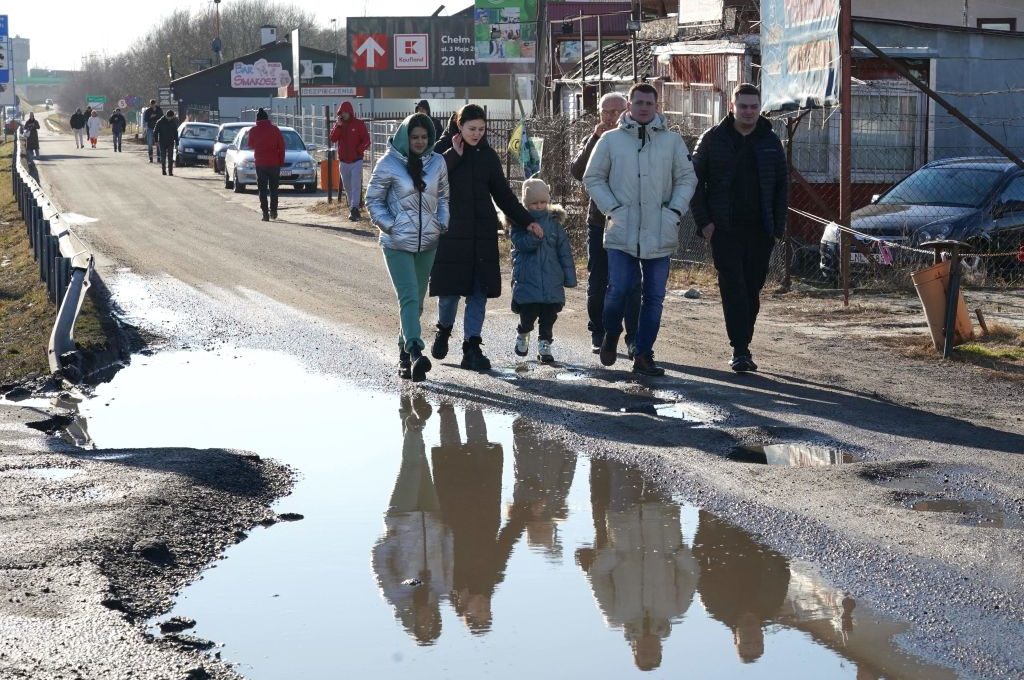Tarnowskie Góry, Poland
There was something faintly obscene about lining up outside the bakery to celebrate Fat Thursday. Granted, it made no difference to Ukrainians whether I ate donuts or scrambled eggs for breakfast. But I had a brief sense of how fortunate it is to live in a peaceful society.
Ukraine is not so lucky. Missiles have been falling throughout the night and day, and Russian soldiers have occupied key positions, right up to the outskirts of Kyiv. Some of us expected Putin to occupy Donbas and leave Western Ukraine alone. That has been proved entirely, tragically mistaken.
After such a long, mysterious military build-up, the speed and scale of the Russian offensive has been stunning. Putin flirted with the idea of a false flag attack but seems to have decided to invade without as much as a defensible pretext. We all knew the Russians were outraged by NATO expansionism, but Western analysts have underestimated the scale of Putin’s revanchist tendencies. No doubt the popular acclaim that a successful war would bring helped to sway his hand.
In Poland, where I live, the mood is tense. Everyone is talking about Ukraine. I asked a student of mine about his recent trip abroad and his response was dazed, as if he was trying to remember something that had happened years before.
Preparations are being made for refugees, who will no doubt come across the Ukrainian border. Poland houses hundreds of thousands of Ukrainian migrants already; war could double or triple their numbers. British and American as well as Polish troops stand ready to welcome them.
A siren allegedly erupted in the village of Medyka, near the Ukrainian border, though there seems to be no evidence that it was connected to military events. One hopes that people will stay calm as rumors tear across the surface of social media.
Poles have a deep distrust of the Russians, of course. Russia was one of the architects of its eighteenth-century partitioning. The Bolsheviks invaded in 1920. Stalin attacked again in 1939, perpetrating the Katyn Massacre, in which 20,000 defenseless prisoners was killed. Finally, after World War Two, the Soviets engineered the establishment of a sadistic Stalinist regime. Hostilities have not been entirely one-way. Poland invaded Russia as part of the Polish-Muscovite War of the 1600s. Nonetheless, throughout modern times, the Poles have had a lot to fear from the Russians.
Some accuse the Poles of allowing history to shape them into hawks. Adriel Kasonta and Doug Bandow accuse the Polish authorities of mixing:
…a touch of megalomania, a generous helping of moral arrogance, and a tendency to ignore the other side’s legitimate security concerns — all seasoned by an aggressive Russophobia.
You would get the sense from Kasonta and Bandow’s article that the Russian authorities are blameless. There is no mention of the Kremlin’s prolific lies regarding its war crimes in Eastern Europe in World War Two. There is no mention of purported Russian cyberattacks on Poland. There is no mention of Belarus, Russia’s closest ally, engineering a migration crisis on the Polish border. Why? Well, it might make it look as if the Poles have a point. Putin’s cruel and unprovoked attack on Ukraine has underlined that point, several times, with differently colored pens.
Kasonta and Bandow charge Poland with opportunistically employing the crisis in Ukraine to elevate their international status. It is true, as Michael Kranz writes in Foreign Policy, that Poland will emerge from this crisis as a more important regional player. But whose fault is that? Was it Prime Minister Mateusz Morawiecki and President Andrzej Duda who ordered Russian troops to mass on the Ukrainian border and commanded them to launch a full-scale war? No.
Still, Poland must be careful. As a migrant here, it is not my place to issue lofty demands regarding what the Polish government should and should not do, but this is a crisis that envelops Europe as a whole. I hope, then, that all opinions are welcome.
Therefore, I encourage Poland’s leaders not to put all their eggs in the basket of US support. They cultivated an especially close relationship with the United States under President Donald Trump, and, as Kasonta and Bandow note, their recent diplomatic efforts have been focused on encouraging US troop deployments to Poland. (The US recently sent 3,000 additional soldiers.)
It is good to have powerful friends, of course, but Poland cannot be too reliant on American support. To what extent, long after declarations of the death of “Pax Americana” became outdated, can it be relied upon? How fair is it for the Americans, meanwhile, for Europeans (not just Poles) to depend so heavily on their armed forces? Peace in Europe is in America’s interests, of course, but not as much as it is in that of Europeans.
So it’s positive that Poland is set to expand its military. According to current plans its troops will more than double, and its funding and hardware will undergo modernization. Russian gas imports falling as Poland has sought to acquire energy independence also seems like a rational step. No doubt other European countries will follow their lead.
My hope — optimistic as it is — is that Poland maintains peace through strength. The expansion of institutional capacity might deter aggression without the need for rhetorical saber-rattling or dangerous diplomatic machinations. Perhaps when this fit of Russian revanchism cools, Poles and Russians can achieve lasting peace and some respect — born of out of their knowledge that their nations both have glorious histories and that conflict can only darken and bloody them.

























